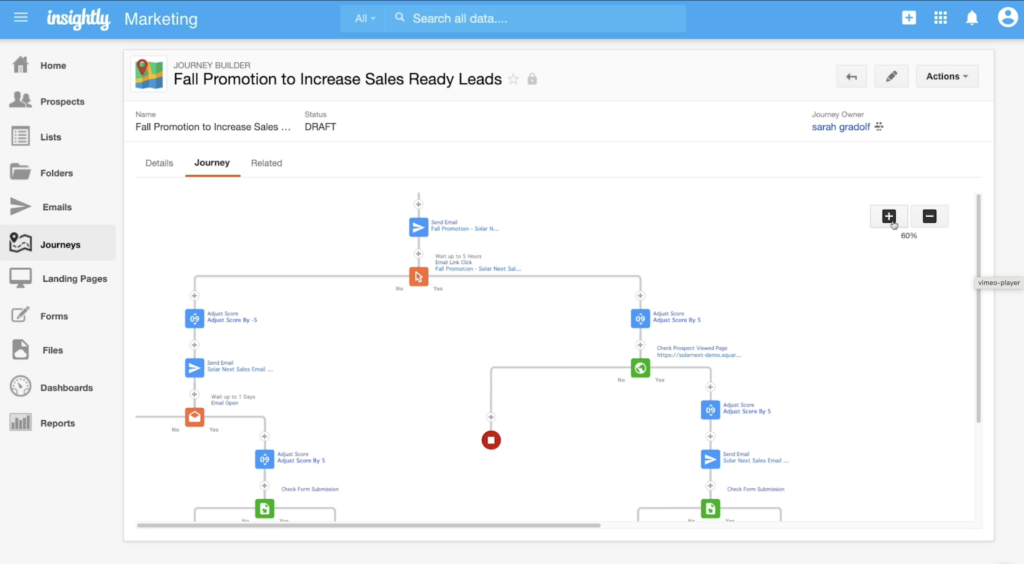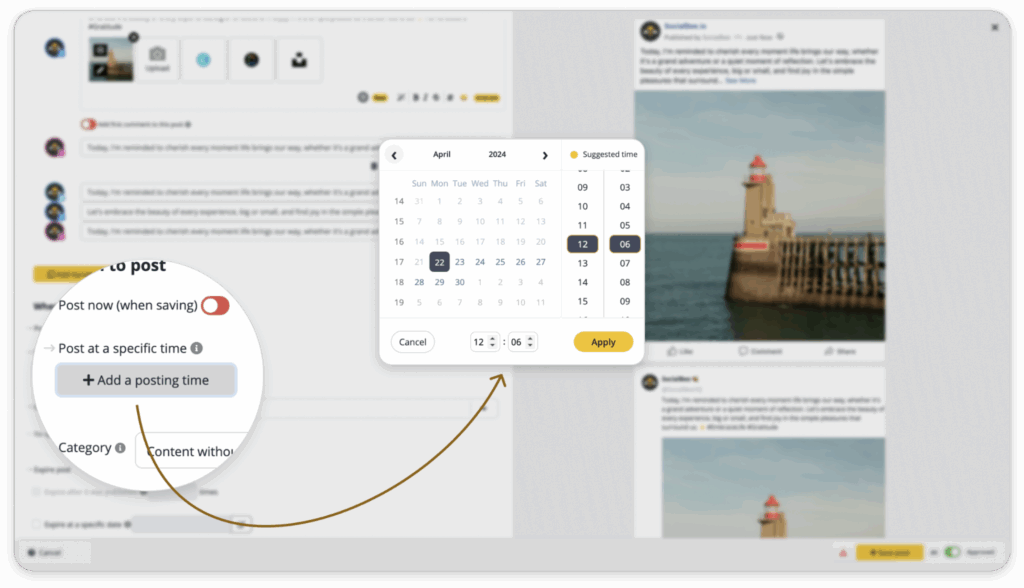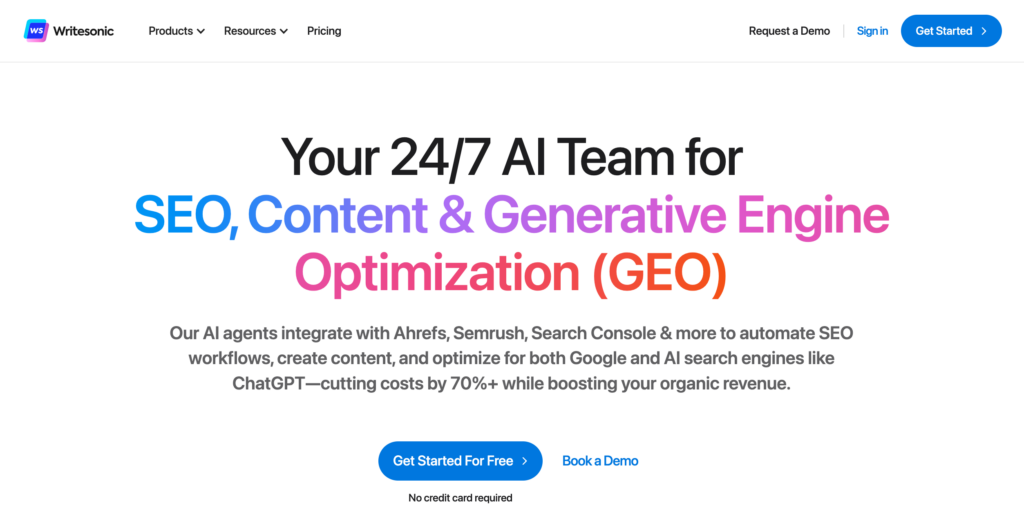
Marketing optimization once required teams of analysts poring over spreadsheets and dashboards. Nowadays, modern AI tools analyze patterns across thousands of customer interactions, predict behaviors, and automate complex tasks –all while marketing teams focus on creativity and strategy.
Every call, email, and website visit generates valuable data. Without AI, most of these insights remain hidden. With it, sales and support teams unlock unprecedented opportunities for personalization and efficiency. The difference shows in conversion rates, customer satisfaction scores, and revenue growth.
This article examines the leading AI marketing tools that have demonstrated significant impact for sales and support teams. We’ve analyzed performance data, implementation challenges, and integration capabilities to identify solutions that deliver measurable results. The featured tools represent the most effective options for specific marketing challenges.
Key Takeaways:
- AI marketing tools deliver the greatest impact when addressing specific workflow bottlenecks rather than attempting complete automation
- Integration capabilities often matter more than standalone features, particularly for sales and support teams
- Implementation strategy determines ROI more than the sophistication of the AI technology
- The most successful companies combine multiple specialized AI tools rather than relying on a single platform
- Measuring concrete performance metrics before and after implementation provides crucial validation for AI investments
Transform Your Marketing Strategy with CloudTalk
The Role of AI in Marketing Optimization
Artificial intelligence reshapes how businesses connect with prospects and customers. Machine learning algorithms analyze call patterns, customer interactions, and sales data to uncover hidden opportunities. Smart automation handles routine tasks while sales teams focus on high-value conversations, mirroring how app store optimization streamlines discovery to let mobile growth teams focus on strategy.
Picture a sales office in 1995. Filing cabinets overflow with lead cards. Sales reps juggle Rolodexes while cold-calling from phone books. Each evening ends with manual call reports and handwritten notes. A single misplaced paper means losing valuable client history forever.
By 2005, digital databases replaced filing cabinets. CRMs emerged, but sales teams still spent hours manually logging calls and updating records. Support agents shuffled between multiple screens, piecing together customer histories from fragmented data.
Fast forward to 2024. That same team now closes deals at twice the speed. They work with fully integrated sales prospecting tools that feed real-time lead data directly into their workflows, ensuring every call starts with the right information. AI analyzes each conversation, spotting patterns humans might miss. A support agent receives a call – the system instantly displays the customer’s history, predicts their needs, and suggests solutions. What changed?
PRO TIP
Consider a typical B2B sales scenario: A prospect mentions budget concerns during a call. The AI instantly flags this objection, correlates it with successful responses from past calls, and provides the sales rep with winning talking points. This level of real-time intelligence transforms standard sales calls into strategic conversations.
Key AI Technologies Enhancing Marketing Workflows
Remember those filing cabinets from 1995? Well, instead of just storing information, AI technologies work in concert to create a living, learning system. Today’s teams operate with data-driven precision, turning every call into an opportunity for optimization.
Here are the key technologies behind AI’s mercurial success:
- Natural Language Processing (NLP): It reads between the lines of every conversation, catching subtle cues in customer sentiment that could make or break a deal – a far cry from handwritten notes in manila folders
- Machine Learning: These algorithms track success patterns across thousands of calls, doing in seconds what used to take teams months to analyze
- Automated Speech Recognition: Turns every conversation into actionable data, replacing those evening sessions of manual call logging
- Predictive Modeling: Spots tomorrow’s opportunities in today’s data, a task impossible in the era of paper records
Top AI-Driven Tools for Marketing Efficiency
Conversation Intelligence & Sales Tools
CloudTalk
A sophisticated cloud-based business calling platform that combines advanced voice capabilities with AI-driven analytics. The system processes every conversation through multiple AI models to extract actionable insights, sentiment analysis, and coaching opportunities.
It integrates with existing business tools while providing rock-solid call quality across 160+ countries. The platform’s AI engine continuously learns from successful interactions, helping teams optimize their communication strategies and improve customer engagement rates.
Use Case:
- Outbound sales campaigns
- Customer support operations
- Call quality monitoring
- Performance tracking
- International business communication
Pricing:
- Lite: 19
- Starter: 34
- Essential: 39
- Expert: 69
Gong
A comprehensive revenue intelligence platform that revolutionizes sales processes through AI-powered analysis. The system captures every customer interaction across calls, emails, and meetings, transforming them into actionable insights. Its neural networks analyze patterns in successful deals, helping teams replicate winning strategies. The platform automatically identifies risks, opportunities, and coaching moments while providing detailed market intelligence.
Use Cases:
- Sales call analysis and coaching
- Deal risk identification
- Revenue forecasting
- Team performance tracking
- Market intelligence gathering
Pricing: Quote-based pricing
Reply.io
A comprehensive sales engagement platform that automates multichannel outreach through AI-powered sequences. The system orchestrates email, calling, and social touch points while analyzing response patterns for optimal timing. It combines prospecting capabilities with engagement analytics, helping teams scale their outreach efforts while maintaining personalization. The platform’s AI engine continuously optimizes sequences based on performance data and recipient engagement patterns.
Use Case:
- Sales sequence automation
- Prospect engagement tracking
- Email campaign optimization
- Performance analytics
- Lead qualification
Pricing
- Email Volume: $49/month/1,000 contacts
- Multichannel: $89/month/per user
- Agency: $166/month/per user
Insightly

Insightly CRM helps align sales and marketing teams with complete visibility. With opportunity tracking, alerts, and custom reporting, marketers can help sales nurture leads and progress deals with the right campaigns at the right time. If you’re an agency, you can use Insightly’s AI-powered tools and automations to create unified customer experiences and maximize client relationships. AI generated email summaries make it easier to capture key points from previous communications, helping marketers gain better visibility into the status of opportunities.
Use Case:
- Sales automation
- Task management
- Email campaigns management
- Performance analytics
- Lead capture forms
Pricing
- Plus: $29/month/per user
- Professional: $49/month/per user
- Enterprise: $166/month/per user
Content Creation & Optimization Tools
ChatGPT
A sophisticated natural language processing AI that transforms how teams create and optimize content. The system understands context, generates human-like responses, and adapts to specific business tones. It processes complex queries and produces everything from email templates to detailed technical documentation. The AI learns from interactions, improving its ability to match your company’s voice while maintaining consistency across all communication channels. Many teams also pair it with a popular AI humanizer to ensure the final output feels more natural and aligned with real-world communication patterns.
Use Case:
- Sales email templates
- Customer response drafting
- Content ideation
- Document summarization
- Script generation
Pricing:
- Plus: $20/month
- Pro: $200/month
- Team: $25/per user/month
- Enterprise: Quote-based
Humanizer Pro
This is a free humanizer tool that you can use online. It is particularly designed to make machine-generated and robotic-sounding texts sound natural and human-like. While many AI platforms excel at generating ideas and drafts, Humanizerpro specializes in polishing that content so it resonates better with readers.
Use Case:
- Refining and humanizing AI-generated drafts
- Enhancing readability for blogs, emails, and reports
- Improving engagement for customer-facing content
- Reducing the need for manual rewriting
- Protect content from being flagged as machine-generated
Pricing:
- Basic: $7/month
- Pro: $12/month
- Advanced: $19/month
Canva
An AI-enhanced design platform that revolutionizes visual content creation for businesses. The system combines traditional design tools with artificial intelligence to suggest layouts, color schemes, and design elements. Its Magic Studio features use AI to remove backgrounds, resize images, and generate variations of designs automatically. The platform learns from millions of professional designs to suggest optimal visual hierarchies and brand-consistent elements.
Use Case:
- Social media graphics
- Sales presentations
- Marketing materials
- Brand asset creation
- Email visuals
Pricing
- Pro: $110/year/person
- Teams: $90/year/person
- Enterprise: Quote-based
Grammarly
A sophisticated AI writing assistant that goes beyond basic spell-checking. The system analyzes writing context, tone, and intent to suggest comprehensive improvements. It uses advanced natural language processing to evaluate clarity, engagement, and delivery effectiveness. The platform adapts to individual writing styles while maintaining company-wide communication standards. Its business-focused features include style guides, analytics, and team performance tracking.
Use Case:
- Email optimization
- Sales proposal refinement
- Documentation review
- Brand voice consistency
- Team writing improvement
Pricing:
- Pro: $12/person/month
- Enterprise: Quote-based
Brandwell
BrandWell is a content marketing platform and person-level website visitor identification tool, designed to help businesses create research-backed content, optimize for SEO and audience engagement, and identify high-value leads by capturing individuals visiting their website.
Use Case:
- Content strategy development
- High-value prospect identification
- Website visitor tracking
- SEO optimization
- Lead qualification
- Content performance measurement
Pricing:
- Essentials: $249/person/month
- Agency: $499/person/month
SocialBee

SocialBee is an AI-powered social media tool for marketers, entrepreneurs, and content creators that helps them streamline content creation and boost engagement by generating captions, creating images, and building a customized posting strategy. It uses AI to recommend what to post, when to post, and on which platforms, making it easy to manage your brand’s presence across social channels.
Use Case:
- Social media strategy planning
- Content creation
- Brand mentions
- Content planning, scheduling and publishing
- Performance tracking and optimizing
Pricing
- Bootstrap: $29/month/1 user/1 workspace
- Accelerate: $49/month/1 user/1 workspace
- Pro: $99/month/3 users per workspace/5 workspaces
ElevenLabs
A cutting-edge AI voice synthesis platform that creates human-like voice content. The system generates natural-sounding speech in multiple languages and accents, with emotion and emphasis control. It can clone voices with permission, create custom voices, and maintain consistent voice branding across all audio content. The platform’s neural networks ensure proper pronunciation of industry-specific terms and natural speech cadence.
Use Case:
- Voice-over creation
- IVR system messages
- Training narration
- Multilingual content
- Audio branding
Pricing
- Starter: $5/person/month
- Creator: $11/person/month
- Pro: $99/person/month
- Scale: $330/person/month
- Business: $1,320/person/month
- Enterprise: Quote-based
Synthesia
An advanced AI video generation platform that revolutionizes how businesses create professional video content. The system converts text into lifelike video presentations using AI avatars and voices in multiple languages. It handles everything from simple product demonstrations to complex training materials, complete with customizable backgrounds, transitions, and visual elements. The platform’s neural networks ensure natural speech patterns and realistic facial expressions.
Use Case:
- Product demonstrations
- Training materials
- Sales presentations
- Multilingual content creation
- Customer onboarding videos
Pricing:
- Starter: $18/person/month
- Creator: $64/person/month
- Enterprise: Quote-based pricing
Runway
A groundbreaking AI-powered content creation studio for video and visual media production. The system combines multiple AI models for text-to-video generation, style transfer, and visual effects. It offers sophisticated editing capabilities including background removal, object tracking, and scene extension. The platform’s generative models create realistic effects and transitions that would traditionally require advanced production skills and equipment.
Use Case:
- Marketing video creation
- Social media content
- Product demonstrations
- Visual presentations
- Creative ad development
Pricing
- Starter: $18/person/month
- Creator: $64/person/month
- Enterprise: Quote-based
Writesonic

Writesonic is an advanced AI writing platform and comprehensive SEO AI tool that enables businesses to generate high-quality content, optimize marketing materials, and streamline content creation workflows while improving search engine rankings through AI-powered recommendations and analytics.
Use Case:
- Content generation at scale
- Marketing copy optimization
- SEO content creation
- Product description writing
- Blog and article production
- Social media content management
Pricing
- Pro: $19/person/month
- Premium: $49/person/month
Workflow Automation & Integration Tools
Zapier
A powerful integration platform that connects business applications through automated workflows without coding. The system uses AI to suggest automation opportunities and optimize existing workflows. It processes millions of tasks daily, connecting over 5,000 apps including CRMs, email platforms, and calling systems. The platform learns from usage patterns to suggest performance improvements and identify redundant processes.
Use Case:
- Call-to-CRM data transfer
- Lead routing automation
- Customer journey tracking
- Document generation
- Cross-platform notifications
Pricing:
- Professional: $16/person/month
- Team: 56/person/month
- Enterprise: Quote-based
Optimove
A sophisticated customer data platform with AI-powered marketing orchestration capabilities. The system unifies customer data from multiple sources to create comprehensive profiles and segments. It uses predictive modeling to determine optimal communication timing, channel preferences, and message content. The platform continuously measures campaign impact, self-optimizes multichannel journeys, and identifies high-value customer opportunities through advanced analytics.
Use Case:
- Customer segmentation
- Multichannel campaign orchestration
- Predictive customer modeling
- Retention optimization
- Revenue impact analysis
Pricing: Quote-based pricing
Unbounce
Quickly launch pages on your own: Building personalized landing pages, popups, and sticky bars is fast and easy with conversion-optimized templates, drag-and-drop elements, and custom scripts. Test smarter, learn faster, and iterate with ease: Create page variants, launch tests, and get insights—all from one platform. Own every aspect of your experiments with no-code A/B testing.
Use Case:
- Lead generation campaigns
- Product launch pages
- Event registration
- Promotional campaigns
- A/B testing marketing messages
- Conversion rate optimization
Pricing:
- Build: $74/person/month
- Experiment: $112/person/month
- Optimize: $187/person/month
- Agency: Quote-based pricing
Audio & Speech Processing Tools
Gladia
A cutting-edge AI platform specializing in speech-to-text and audio processing technologies. The system transcribes conversations with exceptional accuracy while identifying speakers, emotions, and key topics. It processes multiple languages and dialects, capturing industry-specific terminology accurately. The platform’s neural networks continuously improve through machine learning, adapting to unique audio environments and speech patterns.
Use Case:
- Call transcription
- Meeting documentation
- Compliance monitoring
- Customer interaction analysis
- Audio content repurposing
Pricing:
- Pro: $0.612/hour
- Custom: Quote-based
Fireflies.ai
An AI-powered conversation intelligence platform that automatically joins meetings, transcribes conversations, and extracts key insights. The system processes both video and audio meetings, creating searchable transcripts with action items, topics, and sentiment analysis. It integrates with major video conferencing platforms and CRMs, making conversation data accessible and actionable across the organization. The AI identifies patterns in successful meetings and highlights areas for improvement.
Use Case:
- Meeting transcription
- Action item tracking
- Conversation analytics
- Team collaboration
- Knowledge base building
Pricing:
- Free: $0/person/month
- Pro: $10/person/month
- Business: $19/person/month
- Enterprise: $39/person/month
Social Media Management Tools
Sprout Social
A comprehensive social media management platform enhanced with AI capabilities for content optimization and audience engagement. The system analyzes best-performing content patterns, optimal posting times, and audience preferences. It provides AI-powered content suggestions, response recommendations, and trend identification. The platform’s algorithms continuously learn from engagement metrics to refine strategies and improve performance.
Use Case:
- Sales sequence automation
- Prospect engagement tracking
- Email campaign optimization
- Performance analytics
- Lead qualification
Pricing:
- Standard: $199/person/month
- Professional: $299/person/month
- Advanced: $399/person/month
- Enterprise: Quote-based
ContentStudio

A social media management platform excelled in automating social media tasks, enhancing collaboration, and improving content engagement. Marketing teams can leverage AI-driven features like AI-generated content suggestions and automation. ContentStudio’s AI assistant provides tailored content ideas and automates routine tasks, allowing teams to focus on strategic growth. By using AI insights on trending topics, teams can create more engaging content, boost engagement rates, and enhance brand visibility.
Use Case:
- AI writer
- Content publishing
- Analytics dashboards
- Engagement with the audience
Pricing:
- Standard: $19/person/month
- Advanced: $49/2 person/month
- Agency Unlimited: $99/month
Implementing AI Tools in Your Marketing Strategy
“We spent four figures on AI tools last quarter. Our metrics haven’t budged.”
This frustration echoes across sales floors and support centers worldwide. Shiny new AI platforms gather digital dust while teams cling to familiar routines. The culprit? Not technology limitations but implementation strategy.
The difference between transformation and expensive disappointment often comes down to how these tools enter your workflow. Here are some tips to improve your chances of success.
Understand Your Core Challenges
Most sales and support teams face common challenges. Reps spend hours logging calls instead of selling. Support agents repeatedly solve the same issues. Customer data sits trapped in separate systems. Success metrics remain hidden in disconnected platforms.
Identify Implementation Priorities
AI implementation starts with identifying operational bottlenecks. Teams must examine their daily workflows, communication patterns, and performance metrics. This analysis reveals opportunities where AI can deliver maximum impact. The goal: find areas where automation enhances human capabilities rather than replacing them.
Analyze Current Workflows
Examine key areas like meeting follow-up requirements, scaling personalized interactions, and managing call volumes. Look for patterns in deal slowdowns and recurring customer issues. Track time spent on manual tasks versus strategic activities. These insights guide implementation priorities.
Evaluate Tool Requirements
Tool selection follows a simple principle: match capabilities to challenges. Success requires careful evaluation of integration potential, scalability requirements, and measurable impact metrics. The right tools enhance existing workflows without adding complexity.
Assess Integration Capabilities
Integration capabilities determine how well new tools work with current systems. Your phone system, CRM, and support platforms must share data seamlessly. Look for solutions that complement your technology stack while enabling future growth.
Measure Success
Consider concrete performance metrics when evaluating tools. Track improvements in call completion rates, response times, and customer satisfaction scores. Monitor deal conversion speeds and team productivity gains. These measurements validate investment decisions and guide optimization efforts.
Expert Insights on the Future of Marketing Optimization
Karina Egle, SEO Specialist at Whop
Like any other field, AI is transforming the marketing landscape at a fascinating rate. AI can analyze data and create personalized content at a scale that humans cannot match. This allows organizations that utilize AI to process vast amounts of data, learn about people, and adjust campaigns in real-time.
One of the most prominent uses of AI in marketing is automation. Marketers who automate content, social media management, email campaigns, and more are starting to outperform those who don’t.
Apart from automation, “hyper-personalization” is becoming a nominal word in the AI marketing space. Personalizing campaigns by using customer names and locations is a thing of the past. With the use of AI, customers are now getting personalized content on a scale never possible before.
The two pioneer fields, automation and personalization, will only improve and become an industry-standard in the near future, and it’s possible to see this development in real-time by looking at companies like Netflix, Amazon, IBM Watson that utilize or develop these technologies.
Scarlett Finley, Writer at Resource Guru
AI is transforming marketing optimization through predictive analytics, automation, and personalized strategies. However, success isn’t just about AI—it’s also about managing resources effectively. Resource Guru plays a crucial role in helping marketing teams stay organized, ensuring the right people are available at the right time. Without proper scheduling and workload balancing, even the most advanced AI-powered marketing strategies can face execution challenges.
Industry experts predict that the future of marketing optimization will blend AI-driven insights with strong operational efficiency. As AI helps businesses make data-driven decisions, marketing teams will need tools that streamline workflows, prevent burnout, and keep campaigns on track. Resource Guru supports this by providing a structured way to manage time and resources, allowing teams to focus on creativity and strategy rather than logistical bottlenecks.
Ashwini Dave, Digital marketing Executive at Middleware
The future of marketing optimization is defined by AI-driven innovation, data-centric strategies, and advanced automation. Cutting-edge trends such as predictive analytics, AI-powered content personalization, and real-time campaign optimization are transforming how marketers approach their strategies.
Observability and monitoring tools, like Middleware.io, are essential in this evolution, offering deep insights into website performance, user behavior, and engagement metrics. By leveraging AI-driven observability, marketing teams can proactively detect performance bottlenecks, enhance conversion rates, and deliver seamless digital experiences, ensuring campaigns are both highly effective and deeply rooted in data.
Praful Suryawanshi, Sr. Marketing Executive at Openxcell
We emphasize delivering AI solutions that align with business needs but we also use some to streamline our workflow. For example, in the marketing team we use ChatGPT, Gemini, and Perplexity to enhance our marketing efforts. ChatGPT helps with content creation and customer engagement, Gemini provides AI-driven insights for ad optimization, and Perplexity aids in market research and competitive analysis.
AI in marketing is evolving rapidly, enabling efficiency, personalization, and data-driven decision-making. We expect future advancements in predictive analytics and hyper-personalized marketing to further improve customer engagement and ROI.
Cezarina Dinu, Content Marketing Manager at Textmagic
In my experience as a Content Marketing Manager, automation trends are moving toward increased efficiency, personalization, and AI-powered decision-making. Businesses are no longer just looking for tools to automate repetitive tasks; they need smart automation that adapts to customer behavior in real-time. Platforms that provide multichannel communication, AI support, and workflow automation to handle client contacts, such as Textmagic, are excellent examples of this change. Thanks to features like Point AI, businesses can now guarantee that automated responses are immediate, context-aware, and highly relevant to the customers.
The rise of low-code and no-code automation, which enables marketers to design and optimize workflows without depending on developers, is another significant development influencing marketing automation. It allows for greater flexibility and control when implementing AI-powered messaging, automated follow-ups, and dynamic customer journeys. I believe automation will continue to focus on hyper-personalization, seamless cross-channel experiences, and predictive AI, helping brands engage customers more effectively while reducing manual effort.
Ira Vylko, Link-builder and Outreach Specialist at Mailtrap
AI elevates email marketing by optimizing subject lines, content, and send times. It makes audience segmentation more advanced and predicts deliverability issues, ensuring more targeted and effective campaigns. For example, Caesars Entertainment employed an AI platform to craft personalized email content that resonated emotionally with recipients. This strategy resulted in a 12% improvement in open rates and a 24% increase in click-through rates.
Yoshi Kichiro, Copywriter at Supademo
Supademo helps sales, marketing, and customer success teams create interactive product demos for onboarding, support, and sales enablement. Its intuitive interface, custom branding, and seamless sharing improve engagement and boost conversions.
With AI-driven features like automatic text annotations and voiceovers, marketing teams can accelerate content creation, personalize messaging, and adapt quickly to trends.
Beehiiv, a newsletter platform, used Supademo to create interactive product tours, resulting in a 20% increase in qualified signups and a 50% boost in free-to-paid conversions. These demos effectively guided users to their “aha” moment, driving engagement and lead conversion.
Lilit Ayvazyan, Hybrid Outreach Specialist at uSERP
SEO is a key component of marketing optimization, and uSERP specializes in helping brands improve their organic visibility through high-authority backlinks and SEO strategy. Our team works on technical SEO, content strategy, and link-building, supporting businesses in growing their online presence.
Our marketing professionals use a variety of tools such as Perplexity and Google Search Console to help analyze keyword opportunities. In addition, SurferSEO and Clearscope assist in optimizing content for better performance.
The Future of Marketing is AI-Powered
AI marketing tools have evolved from experimental technology to essential business assets. They transform overwhelming data into actionable intelligence while automating routine tasks. This combination allows teams to focus on strategy and creativity rather than manual processes.
The most successful organizations take a strategic approach to implementation. They identify specific workflow bottlenecks, integrate AI solutions with existing systems, and measure concrete performance improvements. This methodical approach delivers far greater returns than simply adopting the latest technology.
CloudTalk exemplifies this strategic approach to AI implementation. The platform doesn’t just connect calls—it analyzes conversations, identifies patterns, and generates actionable insights. Sales teams use these insights to replicate successful pitches. Support agents leverage them to resolve issues faster. Managers apply them to coach effectively and predict customer needs.
With crystal-clear call quality across 160+ countries and seamless integration with existing systems, CloudTalk transforms how businesses connect with customers. The platform’s AI capabilities turn every conversation into an opportunity for optimization while maintaining the human touch that builds lasting relationships.
Take Your Marketing to the Next Level with CloudTalk














